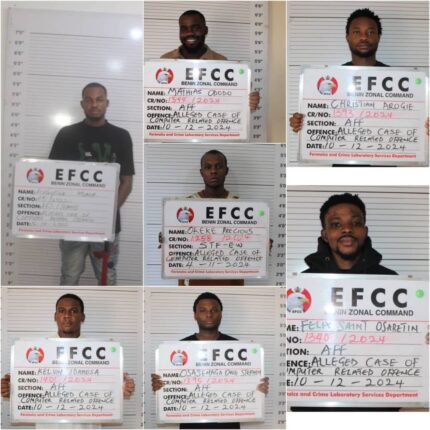The Economic and Financial Crimes Commission (EFCC) has dealt a significant blow to international cybercrime by apprehending a suspected online fraudster responsible for an elaborate scheme that defrauded 139 Australian investors of approximately AUD 8 million. Osang Usie Otukpa was intercepted at the Murtala Mohammed International Airport in Ikeja, Lagos, upon his return from the United States on Friday, December 6, 2024, marking a critical breakthrough in combating transnational digital financial crimes.
The arrest highlights the sophisticated methods employed by modern cybercriminals who leverage social media platforms and complex technological infrastructure to execute large-scale financial fraud. Otukpa’s elaborate operation involved creating a fictitious cryptocurrency investment platform called Liquid Asset Group (LAG), which he strategically used to lure unsuspecting investors through carefully crafted online personas and manipulative digital marketing techniques.
Suspect’s Elaborate Identity Manipulation Exposed
Investigators have revealed that the suspect operated under an extraordinary array of five distinct aliases: Ford Thompson, Oscar Donald Tyler, Michael Haye, Jose Vitto, and Kristin Davidson. This multifaceted identity strategy allowed Otukpa to create complex narratives and build false credibility across various digital platforms, making it challenging for potential victims to discern the fraudulent nature of his investment scheme.
The EFCC’s meticulous investigation uncovered how Otukpa systematically routed the proceeds of his alleged criminal activities through a global cryptocurrency exchange platform. By exploiting the relatively unregulated nature of digital financial systems, he was able to move substantial funds across international boundaries, demonstrating the sophisticated financial engineering employed by modern cybercriminals. The scale and complexity of the fraud underscore the increasing challenges law enforcement agencies face in tracking and preventing digital financial crimes.
Legal Proceedings and Broader Implications
According to EFCC sources, Otukpa will be formally charged following the comprehensive investigation currently underway. The arrest sends a strong message to international cybercriminals about the increasing effectiveness of cross-border law enforcement collaboration and Nigeria’s commitment to combating digital financial fraud.
The case also represents a significant victory for Australian investors who fell victim to the elaborate cryptocurrency scam. By successfully tracking and apprehending Otukpa, Nigerian authorities have demonstrated their capability to pursue and dismantle complex international fraud networks. The investigation serves as a critical reminder for investors to exercise extreme caution when considering digital investment opportunities and to conduct thorough due diligence before committing financial resources.
The EFCC’s successful operation highlights the growing sophistication of financial crime investigations in the digital age. As cryptocurrency and online investment platforms continue to proliferate, law enforcement agencies are developing more advanced techniques to track, identify, and prosecute individuals engaged in transnational financial fraud.
Also Seven Internet Fraudsters Sentenced in Landmark EFCC Crackdown Across Edo and Delta States
The Economic and Financial Crimes Commission (EFCC) has successfully prosecuted seven internet fraudsters in a decisive legal operation spanning Benin City and Asaba. Between December 10 and 12, justices from the Edo State High Court and Federal High Court delivered robust verdicts against individuals involved in sophisticated online fraud schemes. The coordinated judicial actions underscore Nigeria’s commitment to combating cybercrime and protecting digital economic spaces.
The prosecuted individuals, including Precious Okeleke, Austine Iwuner, Saint Felix, Ododo Mathias, Idahosa Kelvin, Bankole Adaranijo, and Owie Osasenago Stephen, were charged with serious offenses ranging from obtaining by false pretense to retaining proceeds of criminal activities. Each defendant faced specific allegations documented under the Advance Fee Fraud and Related Offences Act of 2006, highlighting the precise legal framework governing such digital criminal enterprises.
Sentencing and Legal Consequences Reveal Systemic Approach
The judicial proceedings demonstrated a systematic approach to addressing cybercrime, with each defendant receiving tailored sentences reflecting the severity of their individual cases. Sentences ranged from two to three years imprisonment or substantial financial penalties, providing significant deterrence against future fraudulent activities. Justice W.I. Aziegbemhin, Justice F.A. Olubanjo, and Justice A.N. Erhabor collectively delivered verdicts that not only punished the offenders but also signaled a strong message about the legal consequences of internet fraud.
Notably, all convicted fraudsters were required to forfeit critical technological tools used in their criminal operations, including phones, laptops, and bank account balances. This comprehensive approach ensures that perpetrators are not only legally penalized but also systematically stripped of the infrastructure enabling their fraudulent activities. The prosecution’s strategy demonstrates a holistic method of disrupting cybercrime networks.
EFCC’s Strategic Enforcement Marks Critical Milestone
The successful prosecution stems from a meticulously planned sting operation conducted by EFCC’s Benin Zonal Directorate. Prosecutors F.A. Jirbo, I.M. Elodi, and K.Y. Bello presented compelling evidence that prompted guilty pleas from all defendants, streamlining the judicial process and reinforcing the effectiveness of law enforcement strategies.
While defense counsels pleaded for mercy, emphasizing the defendants’ remorse, the court’s firm sentencing reflects a balanced approach that acknowledges personal rehabilitation while maintaining stringent legal consequences. The verdicts serve as a powerful deterrent, signaling to potential cybercriminals that Nigeria’s judicial system remains resolute in protecting its digital economic landscape from fraudulent activities.
These landmark convictions represent a significant milestone in Nigeria’s ongoing battle against internet fraud, providing a robust legal framework and sending an unequivocal message about the consequences of cybercrime.
Table of Contents
Discover more from OGM News NG
Subscribe to get the latest posts sent to your email.














